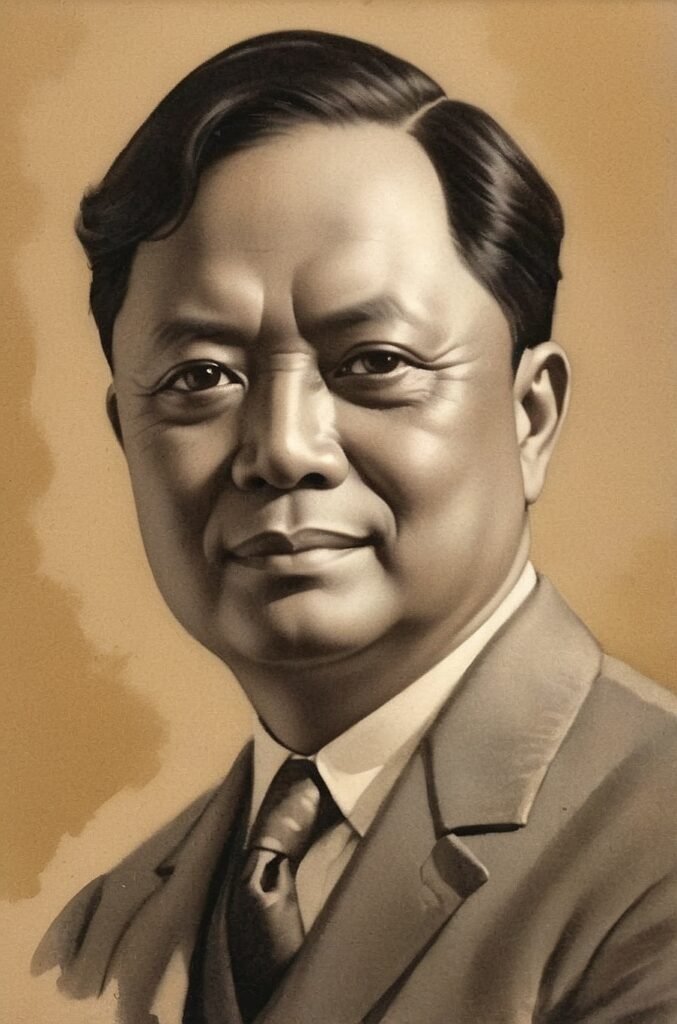Teodoro M. Kalaw stands as a towering figure in Philippine history, particularly in the realms of literature, education, and library science. Born on March 31, 1884, in Lipa, Batangas, Kalaw’s life journey took him from a small town to the pinnacle of intellectual pursuits in the Philippines. His contributions to Philippine historiography and his tenure as the Director of the National Library of the Philippines have left an indelible mark on the nation’s cultural landscape. This comprehensive exploration of Kalaw’s life and works aims to shed light on his multifaceted career and the lasting impact he has had on Philippine society.
Early Life and Education
Childhood in Batangas
Teodoro M. Kalaw’s formative years were spent in the province of Batangas, a region known for its rich cultural heritage and historical significance. Born to parents who valued education, Kalaw was exposed to literature and learning from an early age. The cultural and intellectual environment of his hometown played a crucial role in shaping his future interests and career path. Kalaw’s early education in local schools laid the foundation for his later academic achievements and his passion for Philippine history and culture.
Higher Education and Legal Studies
Kalaw’s pursuit of higher education led him to Manila, where he enrolled at the Liceo de Manila. His academic journey continued at the Escuela de Derecho, now known as the Manila Law School, where he honed his legal skills. The legal education Kalaw received would prove invaluable in his future roles, particularly in navigating the complexities of library administration and historical research. His time in Manila also exposed him to a wider intellectual circle, further fueling his passion for knowledge and scholarship.
Career Beginnings
Early Professional Endeavors
Upon completing his education, Teodoro M. Kalaw embarked on a diverse career path that would eventually lead him to his most notable roles. His early professional life saw him engage in various fields, including journalism and education. These experiences provided Kalaw with a broad perspective on Philippine society and culture, which would inform his later work as a historian and library director. His ability to communicate effectively through writing and teaching became evident during this period, setting the stage for his future contributions to Philippine literature and historiography.
Entry into Public Service
Kalaw’s transition into public service marked a significant turning point in his career. His intellectual prowess and dedication to national development caught the attention of government officials, leading to his appointment to several key positions. This entry into the public sector allowed Kalaw to channel his expertise and passion into projects that would have a lasting impact on Philippine culture and education. His work in various government roles demonstrated his commitment to public service and his ability to effect change through institutional means.
Contributions to Philippine Historiography
Historical Works and Publications
Teodoro M. Kalaw’s contributions to Philippine historiography are both extensive and profound. His works covered a wide range of historical topics, from pre-colonial Philippine society to the American colonial period. Kalaw’s approach to historical writing was characterized by meticulous research and a commitment to presenting a balanced view of Philippine history. Some of his most notable publications include:
| Title | Year | Subject Matter |
|---|---|---|
| La Revolucion Filipina | 1924 | Philippine Revolution |
| Teorias Constitucionales | 1931 | Constitutional Theories |
| Cinco Reglas de Nuestra Moral Antigua | 1947 | Ancient Filipino Moral Codes |
These works, among others, have become essential references for scholars and students of Philippine history, demonstrating Kalaw’s enduring influence on the field.
Analytical Approach to History
Kalaw’s approach to historical analysis was marked by a keen attention to detail and a commitment to objectivity. He sought to present historical events and figures in their proper context, often challenging prevailing narratives and encouraging a more nuanced understanding of Philippine history. His analytical skills were particularly evident in his treatment of complex historical periods, such as the Philippine Revolution and the subsequent American colonial era. Kalaw’s work in this area has contributed significantly to the development of a more critical and comprehensive approach to Philippine historiography.
Director of the National Library
Appointment and Vision
Teodoro M. Kalaw’s appointment as the Director of the National Library of the Philippines in 1929 marked a pivotal moment in his career and in the history of the institution. Upon assuming this role, Kalaw brought with him a vision for transforming the library into a center of learning and cultural preservation. His appointment came at a time when the Philippines was undergoing significant cultural and political changes, and Kalaw saw the National Library as a crucial institution in preserving and promoting Philippine heritage. His vision encompassed not only the expansion of the library’s collections but also the modernization of its services and facilities.
Achievements and Innovations
During his tenure as Director, Kalaw implemented several innovative programs and initiatives that significantly enhanced the National Library’s role in Philippine society. Some of his key achievements include:
- Expansion of the library’s collection, with a focus on acquiring rare books and manuscripts related to Philippine history and culture
- Modernization of cataloging and classification systems to improve access to the library’s resources
- Establishment of branch libraries in various provinces to extend library services beyond Manila
- Introduction of mobile library services to reach remote areas of the country
- Development of preservation and conservation programs for rare and valuable materials
These initiatives not only improved the National Library’s services but also set new standards for library science in the Philippines.
Impact on Library Science in the Philippines
Kalaw’s work at the National Library had a profound impact on the development of library science in the Philippines. His innovative approaches to library management and his emphasis on the importance of libraries in national development inspired a new generation of librarians and information professionals. Kalaw’s tenure saw the professionalization of library services in the country, with increased emphasis on training and education for library staff. His leadership helped establish the National Library as a model institution, influencing the development of other libraries throughout the Philippines.
Literary Contributions
Authorship and Writing Style
Beyond his historical works, Teodoro M. Kalaw was a prolific author in various genres. His literary output included essays, biographies, and works of fiction. Kalaw’s writing style was characterized by its clarity, depth, and ability to engage readers across different levels of education. His command of both Spanish and English allowed him to reach a wide audience, both domestically and internationally. Kalaw’s literary contributions played a significant role in shaping the Philippine literary landscape during the early 20th century.
Notable Literary Works
Some of Kalaw’s most notable literary works include:
| Title | Genre | Year |
|---|---|---|
| Hacia la Tierra del Zar | Travelogue | 1908 |
| Reformas en la Enseñanza del Derecho | Legal Education | 1916 |
| La Campana del Rosario | Historical Novel | 1940 |
These works demonstrate Kalaw’s versatility as a writer and his ability to address a wide range of topics with insight and eloquence.
Educational Contributions
Teaching and Mentorship
Throughout his career, Teodoro M. Kalaw maintained a strong commitment to education. He served as a professor at various institutions, including the University of the Philippines and the University of Santo Tomas. In these roles, Kalaw influenced countless students, many of whom would go on to become prominent figures in Philippine academia and public life. His teaching style was noted for its emphasis on critical thinking and the importance of understanding historical context in analyzing contemporary issues.
Curriculum Development
Kalaw’s influence extended beyond the classroom to the realm of curriculum development. His expertise in Philippine history and culture informed his contributions to educational policy and curriculum design. Kalaw advocated for a more comprehensive approach to teaching Philippine history, emphasizing the importance of primary sources and critical analysis. His work in this area has had a lasting impact on how Philippine history is taught in schools and universities across the country.
Legacy and Influence
Impact on Philippine Scholarship
Teodoro M. Kalaw’s legacy in Philippine scholarship is multifaceted and enduring. His historical works continue to be cited and studied by scholars and students alike, providing valuable insights into Philippine history and culture. The methodologies and approaches he developed for historical research have influenced generations of historians, contributing to the advancement of Philippine historiography. Kalaw’s emphasis on the importance of preserving and studying primary sources has had a lasting impact on archival practices and historical research in the Philippines.
Honors and Recognition
Throughout his life and after his passing, Kalaw received numerous honors and recognitions for his contributions to Philippine culture and scholarship. Some of these include:
- National Artist of the Philippines for Historical Literature (posthumously awarded)
- Various literary awards for his historical and fictional works
- Naming of streets and institutions in his honor across the Philippines
These recognitions testify to the enduring impact of Kalaw’s work on Philippine society and culture.
Challenges and Controversies
Navigating Political Changes
Teodoro M. Kalaw’s career spanned a period of significant political change in the Philippines, from the late Spanish colonial period through the American colonial era and into the Commonwealth period. Navigating these changes posed challenges for Kalaw, particularly in his role as a public servant and intellectual. He had to balance his commitment to Philippine nationalism with the realities of colonial administration, often walking a fine line between advocating for Philippine interests and working within the existing political structures.
Debates and Criticisms
As with any influential figure, Kalaw’s work and ideas were not without their critics. Some historians have debated the accuracy of certain aspects of his historical accounts, while others have questioned his interpretations of key events in Philippine history. These debates, however, have largely served to underscore the significance of Kalaw’s contributions to Philippine historiography, sparking ongoing discussions and research that continue to enrich our understanding of the nation’s past.
Conclusion
Teodoro M. Kalaw’s life and career stand as a testament to the power of scholarship, public service, and cultural preservation. From his early days in Batangas to his influential tenure as Director of the National Library, Kalaw consistently demonstrated a commitment to advancing Philippine culture and education. His contributions to historiography, library science, and literature have left an indelible mark on Philippine intellectual life. As we continue to grapple with questions of national identity and cultural heritage in the 21st century, the work and legacy of Teodoro M. Kalaw remain as relevant and inspiring as ever.
Key Takeaways
- Teodoro M. Kalaw was a multifaceted intellectual who made significant contributions to Philippine historiography, library science, and literature.
- His tenure as Director of the National Library of the Philippines transformed the institution and set new standards for library services in the country.
- Kalaw’s historical works continue to be influential in Philippine scholarship, informing our understanding of the nation’s past.
- His commitment to education and mentorship influenced generations of Philippine scholars and public servants.
- Despite challenges and controversies, Kalaw’s legacy remains a cornerstone of Philippine intellectual and cultural life.
Disclaimer: This blog post is based on historical records and scholarly works available at the time of writing. While every effort has been made to ensure accuracy, our understanding of historical figures and events may evolve with new research. Readers are encouraged to consult primary sources and recent scholarship for the most up-to-date information. Please report any inaccuracies so we can correct them promptly.




